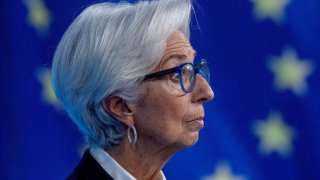
- In a nutshell, the situation is extremely unpredictable.
- But one thing is certain, inflation will be pushed even higher and growth will be impacted by supply issues and high commodity prices.
- Inflation in the euro zone was 5.1% in January and climbed to 5.8% in February as energy prices soared amid the severe military escalation from Russia.
FRANKFURT — The European Central Bank is set for a cautious approach with its monetary policy meeting this week as Russia's invasion of Ukraine impacts, and potentially derails, many of the policy plans it had for the rest of the year.
The meeting, which ends Thursday, comes exactly two weeks after President Vladimir Putin initiated the unprovoked attack on Russia's neighbor. The financial world has changed dramatically since. Oil and gas prices have surged and European banking shares have lost all and more of their gains of the last year.
In a nutshell, the situation is extremely unpredictable. But one thing is certain, inflation will be pushed even higher and growth will be impacted by supply issues and high commodity prices.
Feeling out of the loop? We'll catch you up on the Chicago news you need to know. Sign up for the weekly Chicago Catch-Up newsletter here.
Against this backdrop, the ECB is set to stay put and opt for a wait-and-see approach.
"Energy prices and inflation will be pushed higher, while growth will weaken," said Dirk Schumacher, an ECB watcher with Natixis, in a recent research note to clients.
"As it remains uncertain at this stage how significant this 'stagflationary' shock will turn out to be, we expect the ECB to opt for a wait and see stance at the March meeting."
Money Report
An economy going through stagflation is one that simultaneously experiences stagnant activity and accelerating inflation. This phenomenon was first recognized in the 1970s when an oil shock led to an extended period of higher prices but sharply falling GDP growth.
Inflation in the euro zone was 5.1% in January and climbed to 5.8% in February as energy prices soared amid the severe military escalation from Russia. The inflation development is likely getting worse as gas prices spike to historic highs and Putin threatens to stop gas supplies altogether as an answer to the Western sanctions imposed on Moscow.
"The ECB still has one major advantage over the U.S. Fed. The worsening inflation overshoot in the Eurozone is caused solely by external shocks to supply and not by any factor which the ECB could control," said Holger Schmieding, chief economist with Berenberg, in a note.
"As a result, ECB council members can afford to agree to delay some of the major decisions until the outlook has become clearer."
The jury is still out on what economic impact the war will have on the euro zone, but there are early signs that supply chain issues will be aggravated, weighing even more on production, especially in the manufacturing space.
When it comes to higher interest rates, the majority of economists polled by Reuters only see a first hike in the last few months of this year. However, there is currently no consensus on the month that the ECB could end its Asset Purchase Programme, or APP.
"Optionality" will likely be the buzzword at the ECB press conference on Thursday afternoon as there's a strong lack of clarity in these most uncertain times.
—CNBC's Weizhen Tan contributed to this article.






